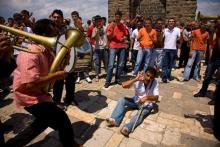Sarajevo, Zagreb, and Belgrade, Bosnia, Croatia, and Serbia
Bosnia, Croatia, Serbia and the EU: One European Future Together? is an interdisciplinary program that examines in depth the Yugoslav conflict and its aftermath, with special emphasis on the roots of the conflict, international intervention, post-conflict transition and the role of EU integration in the long term development of these three states and the Western Balkan region they will influence. Our seven previous programs have challenged many misconceptions about the Balkans as a conflict zone, offering an alternative account of a cultural borderland where religious and cultural interaction and coexistence have been the norm through much of the early modern period and in post WW II Yugoslavia.
Through coursework, guest lecturers, tours, meetings with local diplomats, young politicians, NGO workers and local students, as well as informal contacts with people from all walks of life, we will expose ourselves to a broad spectrum of perspectives and methods of study. Often we will negotiate both the disintegration created by past conflict and the emerging connections that link these states. Extended visits to major cities and centers of government will allow us to document contemporary governmental initiatives, political debates and influential ideas and critical issues shaping transition. In our last program this included a protest against educational reform legislation at the University of Zagreb, tensions about border authority in Kosovo province and the increasing importance of Islam to public and political life in Sarajevo. We also witnessed a conference in which officials from the whole of the Western Balkans, Turkey and the European Council met in Belgrade to discuss accession under conditions of European economic crisis. We also built new working relationships with Geopoetika publishers of contemporary Serbian prose in translation and contemporary world literature in Serbo-Croatian. We also met activists from Nasa Stranka, a reform oriented political party in Bosnia. Our stay closed with a critical visit by Angela Merkel, Chancellor of German to press for a diplomatic solution to the status of Kosovo in advance of the Belgrade EU forum. We have experienced a significant and unanticipated contribution to our learning in each program, one of the aspects of the program we most appreciate.
- CHID 471A: Contemporary Bosnia, Croatia and Serbia (5 credits)
- CHID 471B: Cultural Communication in the former Yugoslavia (5 credits)
- English 490: Contemporary Bosnian, Croatian and Serbian Literature (5 credits)
Note: We recommend that you check with your academic advisor to see how these courses can count toward your departmental requirements.
*Please note that this does not include UW Study Abroad (IPE) Fee ($275), airfare (approximately $1800), food (about $27/day), Study Abroad Insurance ($37/month), other health expenses/immunizations, and personal spending money.
Make sure to read our Fees, Financing, and Withdrawal page for information on paying for your trip.
